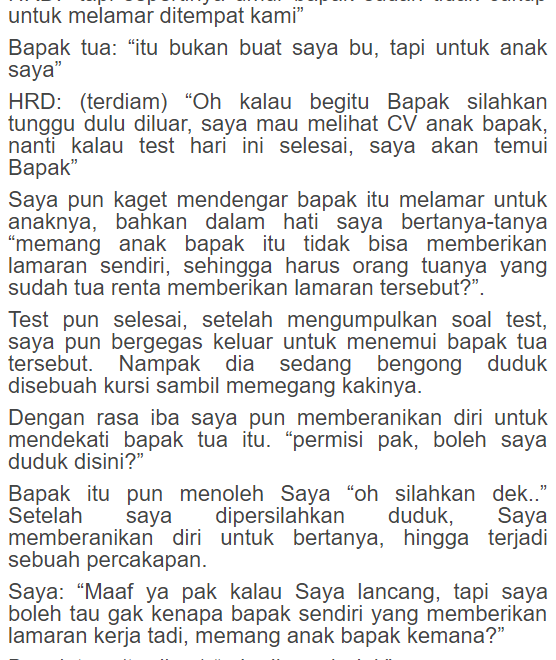Kisah Sedih Seorang Ayah yang Melamarkan Kerja Untuk Anaknya





You should keep proper records to prove your charitable contributions. Contributions can be of 3 types. Your contributions may be in cash or you may make non-cash contributions or you may get reimbursement of expenses while donating your services. Usually, the organization accepting your donation which is more than $75.00 in value, gives you a written statement of confirmation. However some additional records are required for specific contributions.
1. Cash contributions under $250 - You may donate in cash, by check, by credit card or by electronic funds transfer. You may also donate by allowing a deduction from your payroll. You need to keep the following records for such a donation:
a. A canceled check, a bank statement or a credit card statement.
b. A receipt from the qualified organization which should show its name, and the date and the amount of the contribution.
c. If you are making a contribution by a payroll deduction, a pay stub or Form W-2 showing the date and amount of contribution. You should also keep a pledge card issued by the qualified organization.
2. Contributions of $250 or more - You must have a separate acknowledgment for each contribution of $250 or more. If you have made several contributions to the same organization, you should not combine them.
3. Non-cash contributions - if your contribution is not made in cash, you must keep a receipt of that contribution showing the name of the charitable organization, the date of the charitable contribution and a reasonable description of the property given towards contribution. You should also keep a record of the fair market value of the property and the basis on which such fair market value was arrived at. If you want to reduce the fair market value of the property, you should keep the working of the basis on which you made such a reduction. If you attach any terms while gifting the property, a written statement of such terms must be with you. When you leave the property at an un-attended drop side of the charity, you need not keep a receipt.
If you are claiming a deduction over $500 but below $5000, in addition to be the above records, you must keep records showing how you got the property, the approximate date on which you got the property and the cost of such property. If you are unable to get such records, you should attach a statement explaining the reasons for not having the records.
If you are claiming a deduction over $5000, in addition to the above records, you must also get a qualified written appraisal of the donated property from a qualified appraiser.
The acknowledgment you get from the qualified organization must be on paper, mentioning the amount of cash you contributed. If the organization gave you any goods or services depending on your contribution, the fact must be mentioned on the acknowledgment. If you get only intangible religious benefit, a statement to that effect should be attached. The acknowledgment and this statement must be with you before the date you filed your return for the year in which you make the contribution. If the acknowledgment does not mention the date of the contribution, you must have a receipt or a bank statement supporting your claim for payment.
4. Out of pocket expenses -If you volunteer service to a qualified organization, you may get reimbursement of out of pocket expenses while rendering such services. You must have adequate records to prove the amount of expenses. You must also have an acknowledgment from that organization specifying the services you provided, a statement on whether or not the organization provided you any goods or services towards reimbursement, and a statement that the only benefit your received was an intangible religious benefit, if that was the case. You must have this acknowledgment before the date you file your return.
In case you claim expenses towards use of your car, you must keep written records of your expenses. These records must show the name of the organization you were serving and the date every time you used your car for this purpose. If you are claiming the standard mileage rate of 14¢ a mile, you might sure the miles you drove your car for charitable purpose. If you claim deduction of actual expenses, then your records must show the costs for operating the car for this purpose.
You should keep excellent records of your charitable contributions to avoid fines and penalties later.
Chintamani Abhyankar is internet marketer, tax professional and freelance writer. He has done a lot of research on tax systems and is advising people internationally on various aspects of tax planning over last 25 years.
His masterpiece, Stop donating your money to IRS [http://www.planningyourtax.com] is an e-book on the tax secrets which only lucky people knew in the past. His easy to implement strategies can put thousands of dollars in your pocket. Grab a copy now!
Article Source: https://EzineArticles.com/expert/Chintamani_Abhyankar/258490
Article Source: http://EzineArticles.com/1972440

